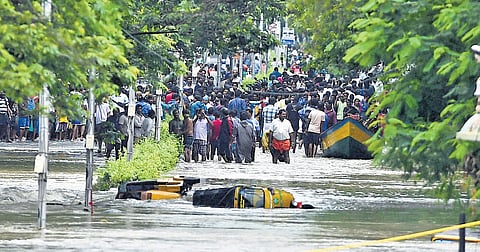

I remember the Novembers and Decembers of our childhood when rain meant rain-holidays and walking home slowly, our uniforms soaking wet, lingering more often than we should have, to do rainy-day things. We were children of the 1970s and this was Madras, not Chennai. To us, rain meant joy —pure and clear.
I remember the boys fishing in the swirl of rainwater pools. I remember how fascinated I was by their skill and deftness. I remember floating paper boats with the other girls in rain puddles. For some reason, mine always capsized whereas my best friend’s didn’t. I never did learn to float paper boats so they didn’t capsize or fish in rain water pools. But that was alright. I knew a rain that was different and a city that did rainy-day time differently.
Decades went by. I moved out of Madras and when I moved back in, it was already Chennai. And then, of course, 2015 happened. The same friend who was queen of paper boats was marooned in a south Chennai neighbourhood for days. No water. No electricity. Just the steady sound of water rising and the drone of helicopters dropping food parcels.
They eventually sent a boat – a real one – to evacuate her. Neither of us was prepared to see the dark humour of this. I got off lightly, relatively speaking. There was water in the basement of our apartment but we were safe and dry, free to feel survivor’s guilt. In December of 2023, I was in Bengaluru to attend a literary festival but couldn’t return home because – guess what – Chennai was flooded again.
The airport was closed and rail tracks were flooded. My friend was marooned once again but this time she was better prepared. We had grown used to our new normal and now we planned around it. There was no question, of course, of floating paper boats or fishing in rainwater pools.
When did rain in Chennai turn to dread? When did our Novembers and Decembers become about flood-preparedness and real boats and helicopters? Why did 2015 happen? Why did 2023 happen? Aren’t we all to blame for what we know was a human-made disaster? What should we have done differently? Why didn’t we do enough to protect those quiet rainy-day joys?
At the heart of the problem is the fact that we didn’t value our childhood joys enough. We didn’t view them through the lens of impermanence, through the lens of collective responsibility. We believed – foolishly – that those joys would be ours forever, that our children would inherit them. We believed – foolishly – that the government or god or some higher power would take care of them for us. We built happily and irreverently and greedily on marshes and rivers. We consumed like there was no tomorrow. We did not see what we should have - that we were custodians of earth, water and rain.
(K Srilata is a poet, writer and academic based in Chennai)